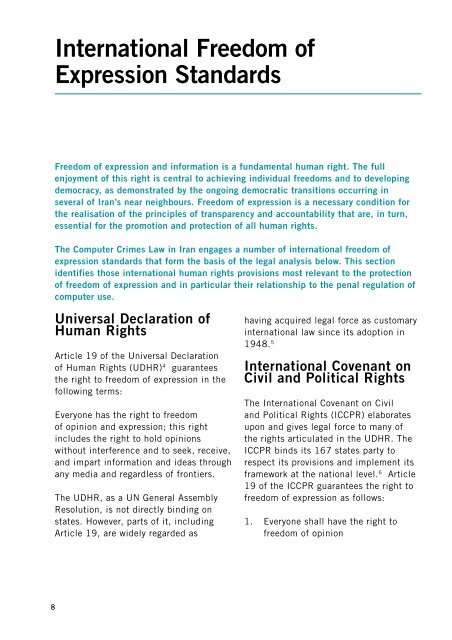Islamic Republic of Iran: Computer Crimes Law
Islamic Republic of Iran: Computer Crimes Law
Islamic Republic of Iran: Computer Crimes Law
Create successful ePaper yourself
Turn your PDF publications into a flip-book with our unique Google optimized e-Paper software.
International Freedom <strong>of</strong><br />
Expression Standards<br />
Freedom <strong>of</strong> expression and information is a fundamental human right. The full<br />
enjoyment <strong>of</strong> this right is central to achieving individual freedoms and to developing<br />
democracy, as demonstrated by the ongoing democratic transitions occurring in<br />
several <strong>of</strong> <strong>Iran</strong>’s near neighbours. Freedom <strong>of</strong> expression is a necessary condition for<br />
the realisation <strong>of</strong> the principles <strong>of</strong> transparency and accountability that are, in turn,<br />
essential for the promotion and protection <strong>of</strong> all human rights.<br />
The <strong>Computer</strong> <strong>Crimes</strong> <strong>Law</strong> in <strong>Iran</strong> engages a number <strong>of</strong> international freedom <strong>of</strong><br />
expression standards that form the basis <strong>of</strong> the legal analysis below. This section<br />
identifies those international human rights provisions most relevant to the protection<br />
<strong>of</strong> freedom <strong>of</strong> expression and in particular their relationship to the penal regulation <strong>of</strong><br />
computer use.<br />
Universal Declaration <strong>of</strong><br />
Human Rights<br />
Article 19 <strong>of</strong> the Universal Declaration<br />
<strong>of</strong> Human Rights (UDHR) 4 guarantees<br />
the right to freedom <strong>of</strong> expression in the<br />
following terms:<br />
Everyone has the right to freedom<br />
<strong>of</strong> opinion and expression; this right<br />
includes the right to hold opinions<br />
without interference and to seek, receive,<br />
and impart information and ideas through<br />
any media and regardless <strong>of</strong> frontiers.<br />
The UDHR, as a UN General Assembly<br />
Resolution, is not directly binding on<br />
states. However, parts <strong>of</strong> it, including<br />
Article 19, are widely regarded as<br />
8<br />
having acquired legal force as customary<br />
international law since its adoption in<br />
1948. 5<br />
International Covenant on<br />
Civil and Political Rights<br />
The International Covenant on Civil<br />
and Political Rights (ICCPR) elaborates<br />
upon and gives legal force to many <strong>of</strong><br />
the rights articulated in the UDHR. The<br />
ICCPR binds its 167 states party to<br />
respect its provisions and implement its<br />
framework at the national level. 6 Article<br />
19 <strong>of</strong> the ICCPR guarantees the right to<br />
freedom <strong>of</strong> expression as follows:<br />
1. Everyone shall have the right to<br />
freedom <strong>of</strong> opinion


